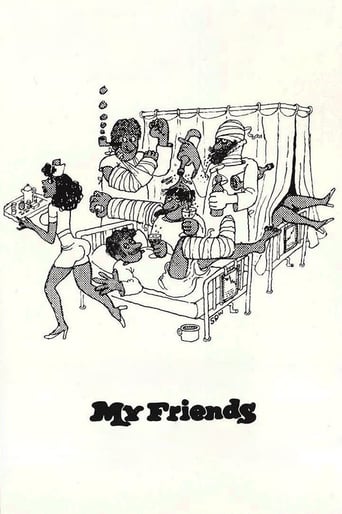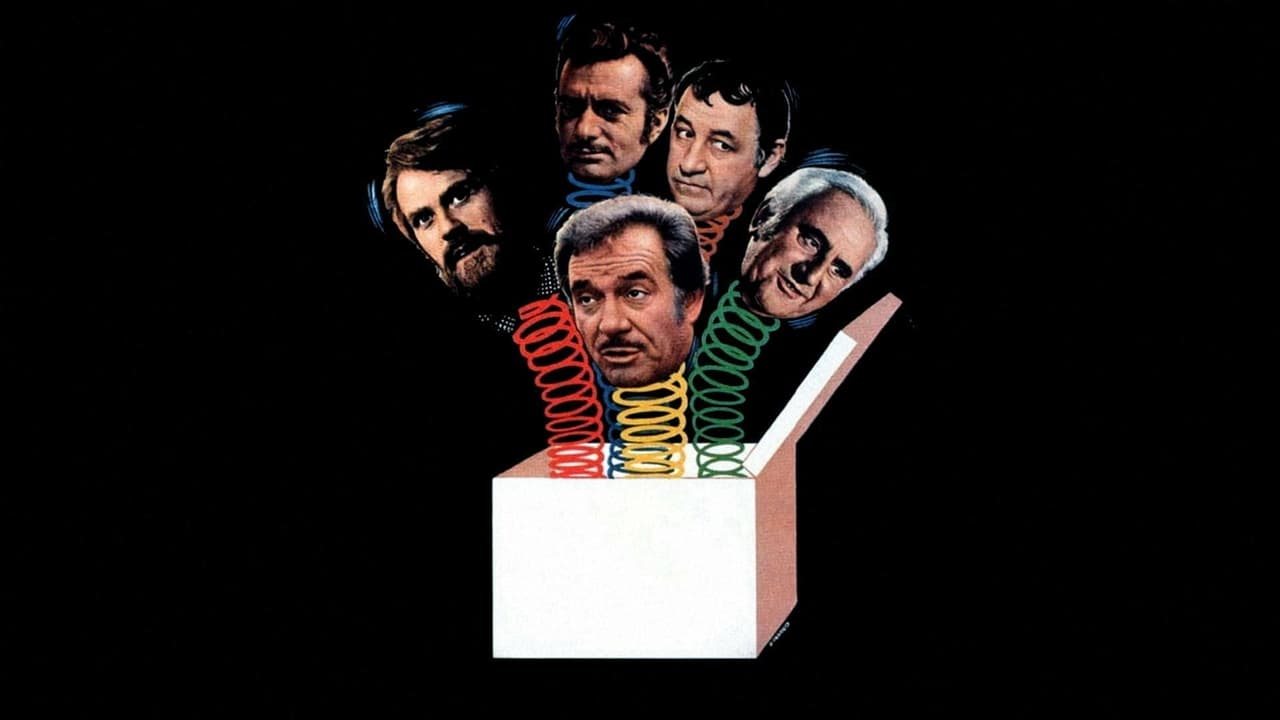lasttimeisaw
MY FRIENDS is originally a project for Italian writer/director Pietro Germi, whose untimely death in 1974 at the age of 60, leaves the film to be taken over by another maestro of the Commedia all'Italiana, Mario Monicelli. The film was a whopping box-office success, which subsequently would spawn two sequels, Monicelli would be back in the saddle with ALL MY FRIENDS PART 2 (1982) and ALL MY FRIENDS PART 3 (1985) would be outsourced to Nanni Loy. A double-bill of these two Monicelli's vehicles, set in Florence, MY FRIENDS has a quartet core of middle-aged men: Count Lello Mascetti (Tognhzzi), a down-and-out ex-nobleman who has squandered all his fortunes, can only slum it in a tiny basement with his suicide-driven wife Alice (Vukotic) and their daughter, which doesn't dissuade him from being smitten with an underage student Titti (Dionisio), who has a predilection for girls over men; the second one is Giorgio Perozzi (Noiret), a journalist separated from his wife Laura (Goodwin) and is irreconcilably at adds with his prim adult son; then there is Rambaldo Melandri (Moschin), a bachelor architect, determined to find his perfect half and lastly is Guido Necchi (Del Prete), married with Carmen (Tamantini) and they own a bar which serves as their haunt. Life is anything but optimistic, Pietro Germi and co.'s script conscientiously draws the milieu from reality, in both Mascetti and Perozzi's cases, one might easily finds company in distress and self- abandonment, but, not these four, feeding on their staunch friendship, the fold never relinquish their idiosyncratic practical jokes and escapades, mostly ingenious and borderline harmless, counting their classic passengers-slapping when a train departs and Mascetti's trademark "supercazzola" gibberish. And following Melandri's tireless pursuit of a married woman, Donatella (Karlatos), an embodiment of Madonna with psychological hiccups, a fifth member, Professor Sassaroli (Celi) is introduced, a renowned surgeon and the husband of Donatella, who is perversely liberal about the affair and is more than happy to not stand in their way if they are really made for each other, and of course, they are not, but Sassaroli is here to stay. One of their most detailed skits involves a penny-pinching pensioner Righi (Blier), who is hustled into believing that the quartet belongs to a mafia mob, with Sassaroli as their boss, dangled by the profitable income, Righi buckles down to join in their "dangerous" line-of-work, and their adventure culminates in a self-organized gangster melee, which leaves Righi in chagrin, utterly side-splitting thanks to Blier's bang-up po-faced bearing. The coda of MY FRIENDS deflects to a more sombre streak - a heart attack does Peruzzi in, all happens in a sudden but no grim sorrow is allowed to percolate, his friends keep their comic esprit de corps alive, even death cannot take it away. ALL MY FRIENDS PART 2 comes 7 years later, the story continues after Peruzzi's abrupt departure, the original cast returns (significantly older) except Del Prete, who is replaced by a more prosaic- looking Renzo Montagnani as Necchi, only the latter is not endowed with Del Prete's dashing and devil-may-care panache. The part 2 doesn't structurally pigeonhole itself as a strict sequel, owing to the huge pull of Noiret's Perozzi, there are abundant flashbacks charting Perozzi and Mascetti's past stories, which take place earlier than those in the first one, while without ghettoizing Sassaroli out of the picture (the original four becomes a quintet), it conspicuously creates some anachronism for viewers with fresh memory of the first installment. Gallantly interpolating the flood of Arno in 1966, the story manages to expound on Perozzi's marriage disintegration and take a taunting spin on Melandri's another devoted courtship to a voluptuous but God-fearing young girl Noemi (Giordano).Contriving an act of pulling Pisa tower back in perpendicular, gate-crushing a singing contest with a risqué song a cappella in the presence of cardinals, a chirpy caper involving a Spanish contortionist (Da Silva), their shticks never disappoint, meanwhile Mascetti has his own familial problem when his slow-witted daughter is impregnated by an unknown rapist and decides to become an unwed mother. Finally, a guest performance from Paolo Stoppa as Savino, a Shylock to whom Mascetti is indebted, he would fall prey into the quartet's pranks (includes a scatological one which sublimely tips the scale), and undergo several "invisible" operations to square off Mascetti's debts. Similarly, another heart attack befalls on one of the main characters near the finish, but this time, to a lesser extent, Tognazzi, Moschin, Noiret and Celi are all sterling comedians, but it is Tognazzi who stands out in his more sympathetic nobleman-in-distress mould. Inscribing their marks as quintessential pieces of Commedia all'Italiana, both films are salacious, amoral and pathologically funny, although the second one only logically contends to take a leaf from its predecessor's book. But essentially they are not connived as far-fetched escapist fares with a shamelessly patronizing smugness, their gypsyish antics are genuinely devised to imbue a positive vibe out of their quotidian misfortunes, despite that they can never hit the right note of the gender politics, yet, what do you expect from a buddy movie?
warrel
Oh God,I am so lucky.I live in a small town in Greece and I have never heard of this film before.And it must be almost impossible to find it in DVD.I accidentally read about this film on the TV program.It was the movie of the day and it is rated with the highest grade.So,I decided to stay awake(because the film started around midnight-like many other great films in Greek TV!)and watch that really great film.It was one of the best decisions I have made recently.The film is about a company of middle-aged men.But they aren't typical 50-year-old men.These men don't care about right behavior,about what others say,about what the rules of society say.They decide to enjoy their lives,so they start making jokes to people and have real fun.They are like children that don't want to get older.First of all,it's one of the best comedies I have ever seen.The scene with Toniatsi and the others slapping the passengers of the train,who have their heads out of the window is one of the funniest scenes ever made.But the greatest part of the movie is,in my opinion,when they pretend the gangsters to make fun of an old man.But,apart from the funny scenes,this films has some things to teach us.It shows,first of all,what real friendship is.Secondly,it teaches us to enjoy our lives.These men have also problems in their lives,like other people.But they decided not to worry so much about them,and as result,they really LIVE THEIR LIVES.And I was really jealous of them,because that's the most important thing,but we often forget that.To sum up,this film is hilarious,moving,sentimental,with really lovable characters and it has some important things to teach.What else do you want from a film?
Close_The_Door
"Amici miei" goes with other films to write the history of the Italian Comedy, or better to say, "la commedia all'italiana" (Comedy the Italian way), which reached its peak in the 1960-70's and turned out to be so different from the comedy genre I happen to know in other countries.Sour? Oh yes, absolutely sour. In "commedia all'italiana" films, you are typically made to heartily laugh through the film, although the situation may be grotesque and tragic, and usually made of razor sharp social satire. The characters are rather "types", masks embodying (social) vices. They can be embarrassing disagreeable people in which you usually recognise your neighbour. But they cannot be yourself, of course.Watching this film then, you may be surprised to be shown hypocrisy, compromises, inane wedding lives. These four family fathers enjoy going wild by making pranks to helpless people. They are selfish rogues who never take anything seriously and make a strange contrast with their children, 30-year-old very serious and reliable children. A situation "blinking" to the 1968 disorders and the social commitment of young people of the time, contrasting with the bourgeois way of life of elder people.Besides, I don't think it is TOTALLY extravagant to think that "Amici miei" is quoting Giovanni Boccaccio's "Decameron". In many of the short stories of this 13th century collection, we see that Florentine people had a taste for pranks since then...
Gustavo Bastos
One of the most hilarious films I've ever seen. From the beginning to the end. Unfortunately, it's not avaliable in video. The story is about five friends that often decide to meet and go out to make fun and jokes with unknown people and friends. From a train station where they hit the faces of passengers outside the windows of the trains, to going in a child's bathroom during a wedding party of people they know!!!


 AD
AD


